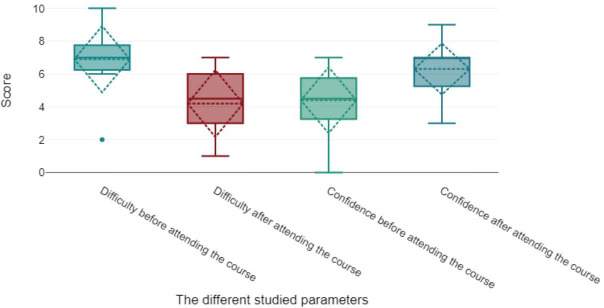Introduction
The COVID pandemic has seriously compromised cardiology training due to restrictions on face-to-face teaching sessions and the cancellation of learning opportunities.1 This has compromised junior trainees' electrocardiogram (ECG) reading skills (foundation and core medical trainees). We showed such an effect in an audit we ran before starting the study. In this study, we aimed to study the effectiveness of online e-training in improving ECG interpretation skills in junior trainees.
Methods
Out of 65 trainees who participated in an audit showing a significant gap in their ECG reading skills, we randomly included 10 trainees who worked in a single district general hospital. We studied them in a pre-post mixed methods study pattern before and after their attendance at a 4-month ECG training course of eight online lectures broadcast on Microsoft Teams. We studied the changes in their subjective perception of confidence in interpreting ECGs independently and the difficulty level they face on reading ECGs on a 1 to 10 Likert scale (where 1 is the least confidence and difficulty, and 10 is the highest confidence and most difficulty). By the end of the course, we tested their ECG reading skills in an online exam covering the ECG training requirements of the foundation training programme.2 We used the independent student t-test to run the statistical analysis.
Results and discussion
In total, 10% of participants were at FY1, 60% at FY2, and 30% in the CT1–2 training year. The participants' confidence in the independent reading of the ECGs significantly increased after the implementation of the e-training model. The perceived difficulty in reading ECGs significantly decreased after attendance at the course (Fig 1) (Table 1). Spearman correlation analysis showed a high negative correlation between the perceived difficulty and the number of lectures attended by the participant (r = −0.63, p = 0.049). The score in the final ECG exam showed a high positive correlation with the number of lectures attended (r = 0.68, p = 0.031) rather than the trainee training stage (r = −0.29, p = 0.418). Our findings confirm the findings of the systematic review by McCutcheon et al,3 showing the potential of online learning in teaching clinical skills to medical professionals. Our study adds an essential piece of evidence on the effectiveness of online learning in teaching clinical skills. The study was limited by the small number of candidates and the limited selection geography from one medical centre.
Fig 1.
Pre- and post-course difficulty and confidence in reading ECGs.
Table 1.
Difference in scores before and after course attendance
| Parameter | Before course attendance | After course attendance | p |
|---|---|---|---|
| The score of the self-confidence scale (mean±SD) | 4.4 ± 2.12 | 6.3 ± 1.64 | 0.038 |
| The score of the perceived difficulty scale (mean±SD) | 6.9 ± 2.13 | 4.2 ± 2.15 | 0.011 |
Conclusion
Cardiology e-training can improve junior trainees' confidence and the difficulty they face in reading ECGs. The number of lectures attended is more important than the level of training experience in determining the amount of improvement of this skill.
References
- 1.Camm CJF, Chapman AR, Gilpin TR, et al. The effect of COVID-19 on training in cardiology: a survey of UK cardiology trainees. Eur Heart J 43. Epub ahead of print 3 October 2022. DOI:10.1093/EURHEARTJ/EHAC544.2843. [Google Scholar]
- 2.McAloon C, Leach H, Gill S, et al. Improving ECG Competence in Medical Trainees in a UK District General Hospital. Cardiol Res 2014;5:51. [DOI] [PMC free article] [PubMed] [Google Scholar]
- 3.McCutcheon K, Lohan M, Traynor M, et al. A systematic review evaluating the impact of online or blended learning vs. face-to-face learning of clinical skills in undergraduate nurse education. J Adv Nurs 2015;71:255–70. [DOI] [PubMed] [Google Scholar]



